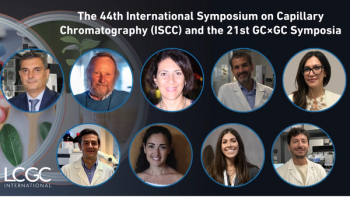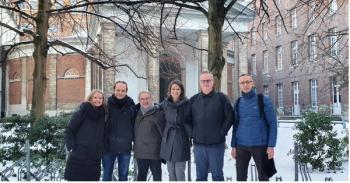
- May 2021
- Volume 17
- Issue 05
FAST Update
A review of FAST’s virtual e-lecture series and discussions.
What is the FASTest way of getting people together and discussing science in these COVID times? Supported by a scientific committee formed by the network of tenure-track assistant/associate professors in the broad field of analytical chemistry in The Netherlands, the Forum for Analytical Science and Technology (FAST) is an important annual gathering for the exchange of the latest achievements in analytical science and technology. This article reviews previous FAST forums, and looks ahead to what’s on offer from FAST’s series of virtual e-lectures and discussions in 2021.
The Dutch COAST initiative has organized very successful meetings focusing on analytical chemistry since 2017. During “normal times” these meetings, branded under the name Forum for Analytical Science and Technology (FAST), have always been two‑day, in‑person gatherings. FAST creates a unique environment where academics, industrial representatives, and students meet and interact to discuss their scientific breakthroughs.
Not surprisingly, as a result of the COVID‑19 pandemic, it has been impossible to organize live FAST meetings in the past year. To compensate—at least in part—for this hiatus, COAST started a series of FAST electronic science talks (FASTest), largely mimicking the intended programme of the live FAST meetings. Rather uniquely, the organization of FAST and FASTest has from the start been supported by a scientific committee formed by the network of young tenure‑track assistant/associate professors in the field of analytical chemistry in The Netherlands.
The first FASTest lecture was held on Thursday 10 September 2020. During that inaugural lecture, Professor Theodore Alexandrov (European Molecular Biology Laboratory [EMBL], Germany) presented his work on spatial metabolomics. Subsequent meetings were held every two to three weeks, often centred around an overarching theme. In the 12 FASTest meetings held to date, presentations of PhD candidates, academic staff members, and scientists from industry—both from the Netherlands and abroad—were featured, and sparked lively discussions.
One of the most recent FASTest meeting in this series was held on Wednesday 3 March 2021. The focus of the meeting was protein characterization. The opening lecture was provided by Iro Ventouri, a PhD candidate at the University of Amsterdam, The Netherlands. She showcased her work related to probing protein stability and association equilibria using asymmetrical flow field‑flow fractionation (AF4). In her work she focused on an important industrial enzyme, β‑D‑galactosidase. The active form of this protein is a noncovalent tetramer. Association equilibria were studied in various carrier solutions, proving that the analytical conditions significantly impact the obtained result. However, when the right conditions are selected, she confirmed that AF4 preserves the labile dynamic equilibria and allows in‑depth characterization of these processes.
The next speaker was Arif Arrahman, a PhD candidate at the Vrije Universiteit Amsterdam, The Netherlands. His work focuses on the characterization and activity profiling of snake venom components. He makes use of reversed‑phase liquid chromatography (LC) to separate proteins and peptides in snake venom. These are subsequently collected onto 96-well plates with the aid of high‑resolution fractionation. He showed that they can evaluate the activity of individual toxins in relevant bioassays. Moreover, by combining this information with proteomics data from the same fractions as well as acute and non‑lethal toxicity data from behavioural zebrafish assays, they developed a truly integrated approach to evaluate snake venom function and complexity.
The session was closed by Ljiljana Paša‑Tolic. She gave an overview of the efforts towards proteomics at single cell resolution within the Pacific Northwest National Laboratory (PNNL), Washington, USA. These single cell measurements are needed to decipher mechanisms that give rise to phenotypic diversity and bridge the critical gap in linking molecular‑scale information to systems‑level understanding of biology. Limited size and volume of single cells, together with the low copy numbers of certain proteins, make their characterization difficult. She showed the recent developments of her group towards near single cell nanodroplet sample (nanoPOTS)‑based proteomics to map proteins and proteoforms comprehensively and sensitively to specific cells and within tissues. She also discussed strategies to broader disseminate near single cell proteomic technologies for assessment of molecular basis of cell-to‑cell heterogeneity and spatially resolved measurements with enhanced sensitivity, throughput, and ease of operation. Overall, a great and inspiring talk to close off this FASTest meeting.
So, what is the FASTest way of getting people together to discuss science in COVID times? Make a programme that speaks to the broader community, have enthusiastic (young) speakers eager to share the latest developments, and make ample space for discussions. And if you—on top of that—make the younger generation responsible for the organization and the questions, these meetings are a guaranteed success. Do you want to join our next FASTest meeting? It is held on 19 May at 16:00 CET with "Food Analysis" as the topic. More information about the programme can be found on https://ti-coast.yvent.nu/en/. Hope to see you there!
For more information and registration, visit the COAST events website at https://ti-coast.yvent.nu/en/
E-mail: isabelle.hulshof@ti-coast.com
Articles in this issue
over 4 years ago
Novel GC–MS Software Programs for Analyzing Seized Drug Samplesover 4 years ago
Controlling Retention Time Drift in Industrial Chromatographyover 4 years ago
SEP21 Previewover 4 years ago
HTC-17 Previewover 4 years ago
Octagon Therapeutics Receives Agilent Golden Ticketover 4 years ago
LCGC Europe and HTC-17 Launch HTC Innovation Award for 2022over 4 years ago
Shimadzu Receives Red Dot Awardover 4 years ago
Differentiating Frontotemporal Dementia Through MetabolomicsNewsletter
Join the global community of analytical scientists who trust LCGC for insights on the latest techniques, trends, and expert solutions in chromatography.




